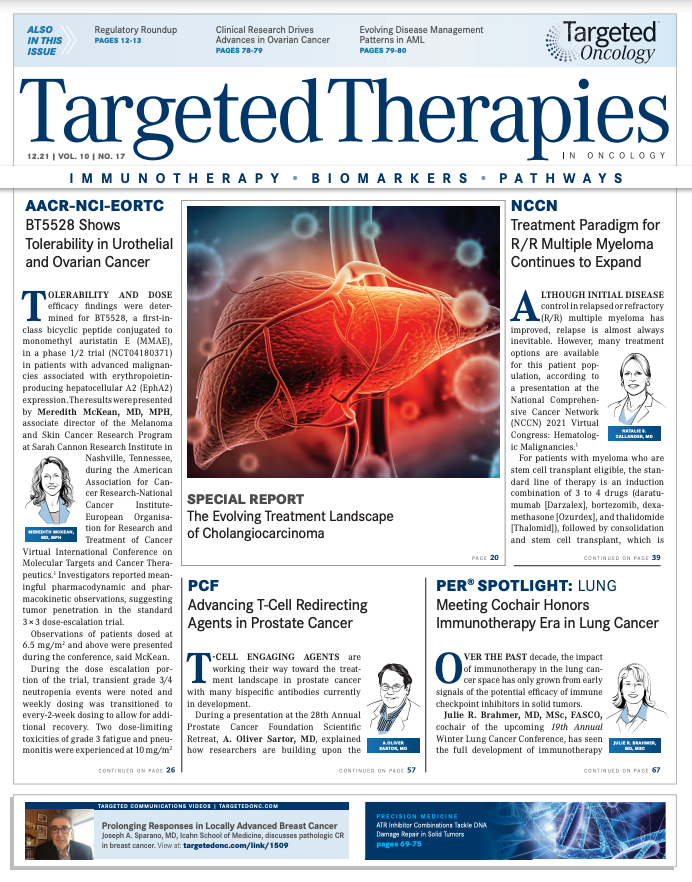Repotrectinib Shows Efficacy in Expanded Cohorts of NTRK+ Solid Tumors
Updated findings from the phase 1/2 TRIDENT-1 trial evaluating repotrectinib showed efficacy in patients with neurotrophic tyrosine receptor kinase fusion-positive advanced solid tumors in expanded cohorts.

Updated findings from the phase 1/2 TRIDENT-1 trial (NCT03093116) evaluating repotrectinib showed efficacy in patients with neurotrophic tyrosine receptor kinase (NTRK) fusion–positive advanced solid tumors in expanded cohorts. The results were presented at the American Association for Cancer Research-National Cancer Institute-European Organisation for Research and Treatment of Cancer Virtual International Conference on Molecular Targets and Cancer Therapeutics.1
TRIDENT-1 is an ongoing registrational trial observing repotrectinib’s effects among several cohorts. The updated fi ndings seek to determine efficacy in 2 additional cohorts: EXP-5 (n= 55) and EXP-6 (n = 40).
“Despite the efficacy of the first-generation TRK inhibitors such as entrectinib [Rozlytrek] or larotrectinib [Vitrakvi], NTRK resistance mutations can occur,” said Benjamin Besse, MD, PhD, of Institut Gustave Roussy in Villejuif, France.2-5
Besse presented the preliminary efficacy findings from TRIDENT-1’s expansion cohorts: EXP-5, patients who are TRK inhibitors (TKI) naïve, and EXP-6, patients who are pretreated with TRK TKIs. Of these patients, 37 (EXP-5 = 15; EXP-6 = 22) were determined to be evaluable. The primary end point was confirmed overall response rate (cORR). From phase 1, 2 patients were included in EXP-5 and 1 patient was included in EXP-6.
Among the 17 patients who were NTRK TKI naïve, the cORR was 41% (95% CI, 18%-67%). The Among the 17 patients who were NTRK TKI naïve, the cORR was 41% (95% CI, 18%-67%). The median duration of response (DOR) was 7.0 months (range, 1.9-7.4). Three patients in EXP-5 had a 20% reduction of their cancer at the first CT scan and are waiting for a confirmatory CT scan.
In EXP-6, patients had a cORR of 43% (95% CI, 23%-66%), and the median DOR was 10.0 months (range, 1.9-15.1).
The duration of treatment for the EXP-5 cohort ranged from 0.9 to 30.7 months. Seventy-one percent of patients are still on treatment. Among the 7 patients that showed a confirmed response, 100% were on treatment. The duration of treatment for the EXP-6 cohort ranged from 0.6 months to 20.8 months. Among the 23 patients in this cohort, 39% are still on treatment. Among the 10 patients that presented a confirmed response, 60% are still on treatment.
Fifty-six percent of patients in EXP-6 developed a resistance mutation (n = 13). The cORR was 54% (95% C, 25%-81%), and the DOR was 7.0 months (1.9-13.7) for these patients.
For patients to be considered for both expansion cohorts, the NTRK fusions had to be detected locally by a next-generation sequencing panel. Of the patients in the pretreated cohort, 50% received entrectinib and 50% received larotrectinib. The median number of patients who had received prior systemic therapy in EXP-5 was 1 vs 2 in EXP-6. In EXP-6, 59.1% had developed a resistance mutation. Brain metastases was observed in 20% of patients in EXP-5 and 18.2% of patients in EXP-6. The median age of patients in EXP-5 was 60.0 years (range, 33-80) and the median age of those in EXP-6 was 54.5 years (range, 23-81). Besse added that there was a good balance between performance status (PS) 0 and PS1.
Both cohorts displayed a variety of tumor types. Patients in EXP-5 had 7 types of tumors with the majority (53.3%) being non–small cell lung cancer (NSCLC). Besse highlighted 1 patient who had salivary gland cancer that was highly sensitive to TRK inhibitors. Patients in the EXP-6 cohort had 11 tumor types, including salivary gland cancer (22.7%), NSCLC (18.2%), and sarcoma (18.2%) as the most prevalent.
Besse commented on the safety profile of repotrectinib among all cohorts, totaling 301 patients, saying the drug was generally well tolerated in TRIDENT-1. Most of the treatment-related adverse events (TRAEs) were either grade 1 or 2. The most commonly reported treatment-emergent AEs (TEAEs) was low-grade dizziness in 60% of the cases. Seventy-six percent of reported dizziness was grade 1, and 4% of patients reported ataxia in the absence of dizziness. Neither dizziness nor ataxia led to treatment discontinuation. Investigators observed reductions and discontinuations due to TEAEs: 27% of patients had a dose reduction, and 11% of patients with TEAEs discontinued the drug. Besse emphasized that TEAEs may or may not be related to repotrectinib. There was 1 case of grade 5 toxicity reported (dyspnea), but it was not related to repotrectinib.
Repotrectinib is a next-generation ROS1/TRK TKI that binds inside ATP pockets in the presence of mutations.6
REFERENCES:
1. Besse B. New drugs on the horizon: repotrectinib in patients with NTRK fusion-positive advance solid tumors: update from the registrational phase 2 TRIDENT-1 trial. Presented at: AACR--NCI-EORTC Virtual International Conference on Molecular Targets and Cancer Therapeutics; October 7-10, 2021; Virtual.
2. Drilon A. TRK inhibitors in TRK fusion-positive cancers. Ann Oncol. 2019;30(suppl 8):viii23-viii30. doi:10.1093/annonc/mdz282
3. Laetsch TW, Hong DS. Tropomyosin receptor kinase inhibitors for the treatment of TRK fusion cancer. Clin Cancer Res. 2021;27(18):4974-4982. doi:10.1158/1078-0432.CCR-21-0465
4. Drilon A, Laetsch TW, Kummar S, et al. Efficacy of larotrectinib in TRK fusion–positive cancers in adults and children. N Engl J Med. 2018;378(8):731-739. doi:10.1056/NEJMoa1714448
5. Drilon A, Li G, Dogan S, et al. What hides behind the MASC: clinical response and acquired resistance to entrectinib after ETV6-NTRK3 identification in a mammary analogue secretory carcinoma (MASC). Ann Oncol. 2016;27(5):920-926. doi:10.1093/annonc/mdw042
6. Drilon A, Ou SHI, Cho BC, et al. Repotrectinib (TPX-0005) is a next-generation ROS1/TRK/ALK inhibitor that potently inhibits ROS1/ TRK/ALK solvent- front mutations. Cancer Discov. 2018;8(10):1227- 1236. doi:10.1158/2159-8290.CD-18-0484

Survivorship Care Promotes Evidence-Based Approaches for Quality of Life and Beyond
March 21st 2025Frank J. Penedo, PhD, explains the challenges of survivorship care for patients with cancer and how he implements programs to support patients’ emotional, physical, and practical needs.
Read More